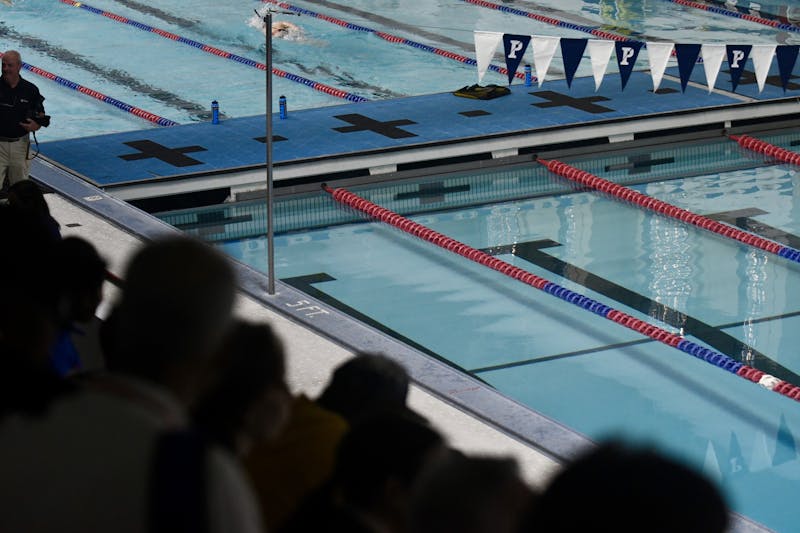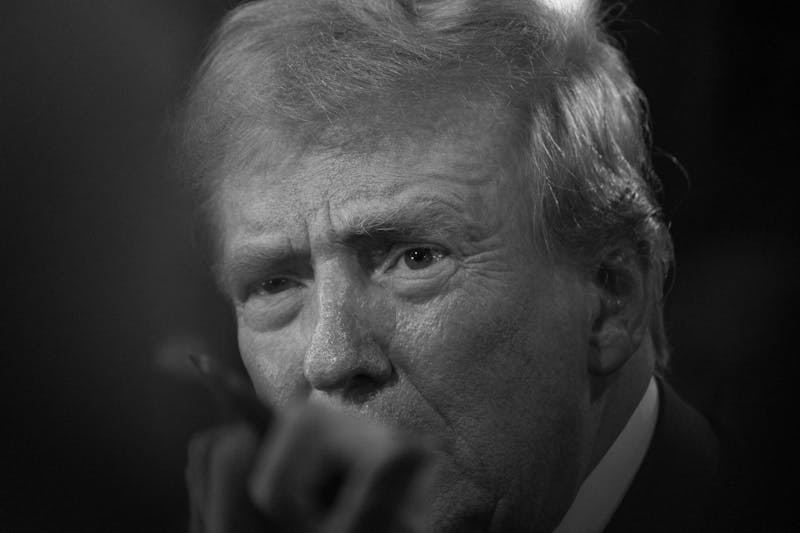Editor's Note: With the upcoming mayoral election November 7, The Daily Pennsylvanian presents a look at Democratic incumbent Ed Rendell. Reporter Lisa Levenson spent time with the mayor earlier this month. They call him Fast Eddie -- because of the way he has dealt with the city's unions, but perhaps more plausibly because of the grueling pace he maintains. At 5:06 p.m., on a typical day of campaigning, the mayor steps out of his office. He walks down the corridor to City Hall's Conversation Hall, where he was supposed to begin addressing a crowd of third-year Penn Law students at 4:45 p.m. At the podium, Rendell extols the virtues of public service work. When he became district attorney in 1978, Rendell says, an assistant district attorney typically stayed in the office for 1.8 years, then left to pursue a more lucrative, less stressful career in the private sector. By the time Rendell's second term ended eight years later, the average assistant district attorney's tenure was 4.6 years. The average prison term and conviction rate had increased, too, he said. The Democratic Rendell beams, the quintessential candidate as he spouts statistics but nevertheless manages to sound sincere. As an incumbent, the pressure of election season is somewhat lessened. But the mayor still makes eight or nine of these public appearances each weekday -- and as many as 16 per day on weekends. From the hectic pace of his campaign, an outside observer would probably never guess that Rendell's party has dominated Philadelphia politics for more than 40 years, and that many people credit him with saving the city from complete fiscal collapse. The same observer probably wouldn't notice that there is a mayoral race going on in Philadelphia this fall, due to the lack of press coverage and public interest. It's now 5:24 p.m. Back in his office after the obligatory handshakes, Rendell talks about the sacrifices he has made during his first term. Dinners and movies with his wife Marjorie, a federal judge, and time with his son, Jesse, are virtually non-existent. He gets by on about five hours of sleep, he adds, taking megadoses of Vitamins C and E to ward off illness. "Fortunately, I've been blessed with an enormous amount of energy," Rendell says. "I don't think that I could do this at the pace that I think is necessary?for more than eight years. And I think this pace is necessary because I can't ignore my substantive work, obviously, but I also can't not make appearances." The appearances are crucial, Rendell says, because even if they are only a few minutes in length, they show city residents that someone in government cares. Even in this campaign season, Rendell says his schedule has not become more rigorous because he already spends almost 20 hours at work every day. "When you're an incumbent, the best campaigning is to be the best mayor," he says. As he talks, he looks over two large blueprints on a table in his office and signs them, indicating his approval. He collects and organizes a ream of letters and memos, neatly sliding what was a blizzard of paper into five manila folders. Only then does he sit down. Asked about the University's relationship with the city, Rendell says it has improved during his term. The resolution of the Mayor's Scholarship case and the Payment in Lieu of Taxes/Services in Lieu of Taxes (PILOT/SILOT) issues have resulted in "a new era of terrific cooperation," he says. The mayor has a list of his most important accomplishments ready, too -- cutting the city's budget deficit and ending the past three years with surpluses, increasing city services and upgrading equipment and developing the city's economy. In fact, despite the Philadelphia Naval Shipyard's closure this fall and the collapse of a deal with German shipbuilder Meyer Werft to reopen it, Rendell says the city should gain 1,400 jobs this year. This can be compared with 1993, he adds, when Philadelphia lost 13,000 jobs. "We've got to be continually fiscally sound and manage well," Rendell says, describing his priorities for a second term while walking toward his black Crown Victoria. At 5:38 p.m., a car pulls away from City Hall, on the way to a premiere party for a new local beer. Rendell admits that the 2002 governor's race is a possibility, although political analysts are predicting that he will try for the U.S. Senate. His Republican opponent, former state Sen. Joe Rocks, has said sarcastically that Rendell -- known as "America's Mayor" -- should run for Mayor of the World, a suggestion Rendell shrugs off with a chuckle. Arriving at the City Tavern at 5:46 p.m., Rendell quaffs some beer and jokes with the brewery's investors, promising one an appearance for her group the next week. He grabs a sandwich, but does not sit down to eat it. Rendell is back in the car at 6:09 p.m., heading to a fund-raising campaign with the arts community at the waterfront -- just the first in a string of events where the city's chief executive will play politics and schmooze with supporters. His schedule shows that he will stop at other events before retiring to his East Falls home around 10 p.m. He says that after spending time with Jesse and looking over paperwork, he might get to bed by 1 a.m. Tomorrow is another day, and America's Mayor will do it all over again.
The Daily Pennsylvanian is an independent, student-run newspaper. Please consider making a donation to support the coverage that shapes the University. Your generosity ensures a future of strong journalism at Penn.
DonatePlease note All comments are eligible for publication in The Daily Pennsylvanian.







